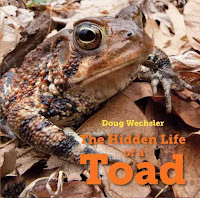Today's guest
contributor is Patrick Gall. Patrick works as a librarian for children
in preschool through eighth grade at the Catherine Cook School in
Chicago. He served on the 2015 Newbery
Award Committee and is a guest reviewer for The Horn Book Magazine.
Geisel Award committees rarely recognize fact-focused books.
Of the 51 total Geisel Medal/Honor recipients (as of 2017) it
appears that only 3 books can accurately be classified as “nonfiction” –
meaning that they are regarded, first and foremost, as factual (and cataloged
accordingly in most libraries). For an analysis of these fact-driven and
thoughtfully executed titles see Kahla Gubanich's 2016 Guessing Geisel post Geisel-Worthy
Nonfiction: Past and Present.
More interestingly, perhaps, is that many more Geisel
awardees
can best be described as “informational” (helpfully defined in the Sibert
Medal terms and criteria as “written and illustrated to present, organize, and interpret
documentable, factual material”). Unlike the 3 previously identified works of
nonfiction, the factual content of many informational books is often covert, or
rather presented, organized, and interpreted through fictional scenarios. This allows
for effective and seamless narratives where blades of grass humorously tackle suffixes;
a dog and mouse reinforce letter knowledge during a wily chase; birds and bears
contemplate relativism through goofy arguments; an anthropomorphized mouse
models getting dressed; and cause/effect dynamics are explored through ingenious
cutouts and page turns. These books include We
Are Growing! by Laurie Keller (2017
Medal), Oops, Pounce, Quick, Run! by
Mike Twohy (2017 Honor), You Are (Not)
Small by Anna Kang (2015 Medal), Up,
Tall and High! by Ethan Long (2013 Medal), Little Mouse Gets Ready by Jeff Smith (2010 Honor), One Boy by Laura Vaccaro Seeger (2009
Honor), and First the Egg by Laura Vaccaro Seeger (2008 Honor).
When revisiting these informational Geisel awardees it becomes
clear that they largely center on English language development and the natural
world. This is not to say that superb fact-rich books about other subjects
(such as history) for young readers haven’t been published since 2005 –
consider Lightship by Brian Floca
(2007), Underground by Shane Evans (2011),
and Viva Frida by Yuyi Morales (2014)
– they just haven’t won. And while Scholastic, DK, National Geographic, and other
publishers produce a fairly wide range of factual early reader titles every year,
they simply don’t win either.
With that in mind, I searched widely for nonfiction/informational
2018 Geisel contenders that aren’t about language development and nature – yet
excellent titles focused on those subjects still rose to the top of my list. They
are (so far):
- Penguin Day: A Family Story by Nic Bishop (Scholastic Press) – Straightforward text, strong design, and exquisite photography come together to depict a day in the life of a rockhopper penguin family. Similar in format and tone to Bishop and author Joy Cowley’s wonderful Red-Eyed Tree Frog (1999) and Chameleon, Chameleon (2005).
- Wordplay by Ivan Brunetti (TOON) – Compound words (such as playground, bookworm, and eggplant) literally come to life in a young student’s mind – thanks to a clever use of thought balloons and smart panel layouts – resulting in a real compound word workout.
- Something’s Fishy by Kevin McCloskey (TOON) – An excellent addition to McCloskey’s Giggle and Learn easy-to-read comics series – arguably the best since We Dig Worms! (2015). A gamut of fish facts, from basic (what gills do) to bold (a goldfish can grow a foot long, in the right conditions), are explored via informative captions, word balloon dialog, and the occasional gag.
- My Awesome Summer by P. Mantis by Paul Meisel (Holiday House) – P. Mantis provides an energetic first-person account of her development from nymph to adult. Friendly, bright, full-page illustrations are regularly accompanied by short updates about who is eating who – including one’s own insect siblings!
- Round by Joyce Sidman (HMH) – This poetic reflection on all things round in nature does much more showing than telling – with purposeful illustrations that, when coupled with the heady text, deliver a great deal of informational content.
- The Hidden Life of a Toad by Doug Wechsler (Charlesbridge) – The first 3 years of a female American toad’s life – from egg to tadpole to toadlet to breeding adult – are ambitiously documented through original photographs and simple, playful text.
My hope is that we’ll continue to see even more nonfiction/informational
2018 Geisel contenders this fall – especially outside of the established
language development and nature subject ranges – and that this year’s committee
will recognize and eagerly reward those outsiders.
What titles have I missed, and what are you looking forward
to seeing this fall? Please share your thoughts in the comments.









No comments:
Post a Comment
Note: Only a member of this blog may post a comment.